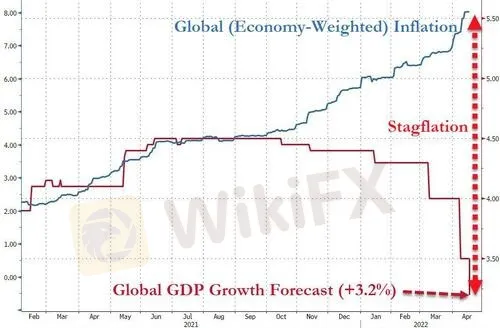WikiFX report: World Bank & IMF Warn of Stagflation Ahead
Abstract:The IMF cautioned on Tuesday that the global economy is entering an inflationary period, urging central banks to be "very, very vigilant" and take early steps to tighten monetary policy if price pressures persist.
The global economy is entering a phase of inflationary risk, the IMF warned on Tuesday, as it called on central banks to be “very, very vigilant” and take early action to tighten monetary policy should price pressures prove persistent.
It can be recalled that, over the last couple of days both the IMF and World Bank have heavily downgraded global economic growth forecasts whilst both acknowledging and, ironically proposing to fuel more inflation with more stimulation. Hello stagflation…
Initially The World Bank slashed its 2022 global growth by 22% from 4.1% to 3.2% (for context 2021 saw 5.7%). President David Malpass proposed a $170 billion, 15 months long ‘crisis response package’, with nearly a third of that deployed in just the next 3 months.

“”This is a continued, massive crisis response given the continuation of the crisis,“ he said, adding that the new initiative will exceed the $157 billion mobilized for the initial phase of the Covid-19 pandemic.”
Let us remind you of the inflation such reckless money pumping as already unleashed and the stagflationary alligator trap is presents.
According to the statement released by IMF saying In the matter of a few weeks, the world has yet again experienced a major, transformative shock,‘’ IMF chief economist Pierre-Olivier Gourinchas wrote in the foreword to the funds World Economic Outlook report. He continued
“Just as a durable recovery from the pandemic-induced global economic collapse appeared in sight, the war has created the very real prospect that a large part of the recent gains will be erased.”
Similar to The World Bank they revised their projection for global growth downwards to 3.6% for both 2022 and 2023, down from the 4.4% growth it had expected for 2022 just 3 months ago.
And they proceed to warn that“The effects of the war will propagate far and wide, adding to price pressures and exacerbating significant policy challenges.”
“the risk is rising that inflation expectations drift away from central bank inflation targets, prompting a more aggressive tightening response from policymakers. Furthermore, increases in food and fuel prices may also significantly increase the prospect of social unrest in poorer countries.”
And possibly most concerningly the warn the war “increases the risk of a more permanent fragmentation of the world economy into geopolitical blocks with distinct technology standards, cross-border payment systems, and reserve currencies. Such a tectonic shift would cause long-run efficiency losses, increase volatility and represent a major challenge to the rules-based framework that has governed international and economic relations for the last 75 years.”
There is one monetary asset that has survived, and indeed thrived in, the test of time amid such monetary and geopolitical tectonic upheavals.
Read more

Account Deleted, Funds Gone: A New Broker Tactic to Beware Of?
The main trading dashboard account of a trader for LQH Markets was completely deleted by a broker. The trader is not being offered any access to their funds or profits. This incident shows the risks of trading markets and brokers and the importance of protecting your funds without relying on any broker.

PrimeXBT Expands Trading Options with Stock CFDs on MT5
PrimeXBT launches stock CFDs on MetaTrader 5, offering shares of major U.S. companies with crypto or USD margin for enhanced multi-asset trading.

Broker Comparsion: FXTM vs AvaTrade
FXTM and AvaTrade are two well-established online brokers offering forex and CFD trading across global markets. Both enjoy strong reputations and high ratings on WikiFX—FXTM holds an AAA overall rating, while AvaTrade scores 9.49/10, indicating they’re regarded as reliable choices by the community. However, since brokers have great reputation in the industry, how do we know which one is more suitable for individuals to invest in? Today's article is about the comparison between FXTM and AvaTrade.

Pi Network: Scam Allegations Spark Heated Debate
A whistleblower report has surfaced, casting doubt on the legitimacy of Pi Network, alleging psychological manipulation, opaque operations, and potential financial exploitation. What is your take on this?
WikiFX Broker
Latest News
Love, Investment & Lies: Online Date Turned into a RM103,000 Scam
Broker’s Promise Turns to Loss – Funds Disappear, No Compensation!
Broker Took 10% of User's Profits – New Way to Swindle You? Beware!
Pi Network: Scam Allegations Spark Heated Debate
Broker Comparsion: FXTM vs AvaTrade
Account Deleted, Funds Gone: A New Broker Tactic to Beware Of?
El Salvador and U.S. Launch Cross-Border Crypto Regulatory Sandbox
The Instagram Promise That Stole RM33,000
Kraken Partners with Alpaca to Offer U.S. Stocks and Crypto
Before You Trade the Next Big Thing, Remember the Dot-Com Collapse
Rate Calc

